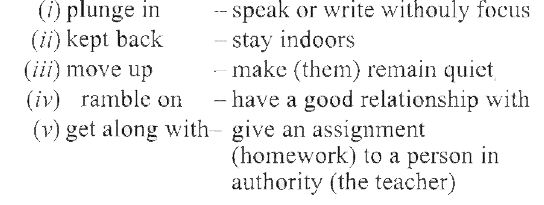Find the sentences in the story with the following phrasal verbs.
(1) Lined up : Sure, a hundred of them all lined up. (2) Thought of: And she thought of the glowing picture those hundred dresses made-all lined up in the classroom. (3) Took off: Miss Mason took off her glasses, blew on them and wiped them by her soft white handkerchief. (4) Stood by : She had stood by silently and that was just as bad as what Peggy had done.
Similar Questions
Now find the sentences in the lesson that have the phrasal verbs given below. Match them with their meanings. (You have already found out the meanings of some of them.) Are their meanings the same as that of their parts? (Note that two parts of a phrasal verb may occur separately in the text.)


View SolutionIV. Find sentences in the story with negative words, which express the following idea emphatically.
The trees lost all their leaves.
____________________________________.
View SolutionFind sentences in the story with negative words, which express the following ideas emphatically.
The trees lost all their leaves.
…………………………………………………………………………………….
View SolutionFind sentences in the story with negative words, which express the following ideas emphatically.
The trees lost all their leaves.
View SolutionIV. Find sentences in the story with negative words, which express the following idea emphatically.
The letter was addressed to God himself.
_________________________________________.
View SolutionFind sentences in the story with negative words, which express the following ideas emphatically.
The letter was addressed to God himself.
…………………………………………………………………………………….
View SolutionFind sentences in the story with negative words, which express the following ideas emphatically.
The letter was addressed to God himself.
View SolutionPhrasal verbs
The sentence below is taken from the text you have read. The phrase in italic is a phrasal verb. A phrasal verb is a combination of words (a verb + a preposition, for example check in or a verb + an adverb, for example break down). When they are used together, they usually take on a different meaning to that of the original verb.
... Walk away from the old Dakota.
walk away is a phrasal verb which means to move away from.
Find out the meaning of the following phrasal verbs and use them appropriately in sentences.
walk in
View SolutionPhrasal verbs
The sentence below is taken from the text you have read. The phrase in italic is a phrasal verb. A phrasal verb is a combination of words (a verb + a preposition, for example check in or a verb + an adverb, for example break down). When they are used together, they usually take on a different meaning to that of the original verb.
... Walk away from the old Dakota.
walk away is a phrasal verb which means to move away from.
Find out the meaning of the following phrasal verbs and use them appropriately in sentences.
walk out
View SolutionPhrasal verbs
The sentence below is taken from the text you have read. The phrase in italic is a phrasal verb. A phrasal verb is a combination of words (a verb + a preposition, for example check in or a verb + an adverb, for example break down). When they are used together, they usually take on a different meaning to that of the original verb.
... Walk away from the old Dakota. walk away is a phrasal verb which means to move away from.
Find out the meaning of the following phrasal verbs and use them appropriately in sentences.
walk out
View Solution
